Main navigation
Search Results
-
-
-
-
Funding Future Insight Prize
Funding programme, Funded by: Merck KGaA, sb_search.searchresult.label.programSubmissionDate: 31/12/2022https://www.biooekonomie-bw.de/en/databases/funding/future-insight-prize -
Dossier - 09/04/2018 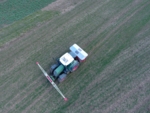
Digitisation in agriculture - from precision farming to farming 4.0
Automated steering systems, data-driven targeted application of fertilisers and pesticides, field robots and drones, soil analysis sensors, autonomous driving - digitisation is advancing in agriculture as elsewhere. The question asked by farmers and by society in general is whether the increasing adoption of digital technologies in agriculture is a curse or a blessing.
https://www.biooekonomie-bw.de/en/articles/dossiers/digitisation-in-agriculture-from-precision-farming-to-farming-40 -
Dossier - 08/03/2018 
Building sustainably - actively protecting the climate
Using renewable and recycled raw materials, minimising the use of water and energy during construction works and subsequent operation of a building, conserving resources and protecting the environment while maintaining biodiversity are all important components of sustainable building construction.
https://www.biooekonomie-bw.de/en/articles/dossiers/building-sustainably-actively-protecting-the-climate -
Dossier - 20/03/2017 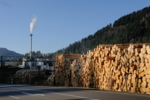
Lignin – a natural resource with huge potential
Petroleum is the raw material for basic chemicals. Growing demand and dwindling resources mean that the chemical industry is increasingly focusing on renewable resources. Lignin is a wood component that is proving to be a promising resource. It is currently almost exclusively used for generating energy, although it could also be used for other purposes. In Baden-Württemberg, a research consortium is specifically focused on exploring its…
https://www.biooekonomie-bw.de/en/articles/dossiers/lignin-a-natural-resource-with-huge-potential -
Dossier - 14/06/2016 
CRISPR/Cas – genome editing is becoming increasingly popular
The number of publications and patents that involve the CRISPR/Cas system has been increasing exponentially since the technique was first described a few years ago. The increase in funding for projects involving CRISPR/Cas also demonstrates how powerful this new method is. The targeted modification of genomes (also called gene or genome editing) using CRISPR/Cas is extraordinarily accurate and also has the potential to cure hereditary diseases.
https://www.biooekonomie-bw.de/en/articles/dossiers/crisprcas-genome-editing-is-becoming-increasingly-popular -
Commitment for the future of the region https://www.biooekonomie-bw.de/en/bw/location/akteursplattform-biooekonomie-baden-wuerttemberg
Akteursplattform Bioökonomie Baden-Württemberg
-
-
Dossier - 30/09/2014 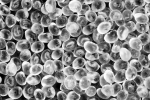
Industrial biotechnology a challenging change to the raw material base
Biogenic raw materials have never been as popular as they are now. Efforts to tap renewable carbon resources are already underway, despite the fact that new oil drilling technologies are boosting fossil fuel stockpiles. In the medium term, industry will have to expand its raw materials base, and in the long term it may have to renew it completely. Industrial biotechnology is one of the key technologies in the transition.
https://www.biooekonomie-bw.de/en/articles/dossiers/industrial-biotechnology-a-challenging-change-to-the-raw-material-base -
Dossier - 16/06/2014 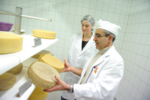
Biotechnology as a tool for the production of food
Biotechnology opens up numerous opportunities for the food industry. The targeted use of biotechnological methods can help reduce the quantity and number of unhealthy ingredients in foods as well as degrade allergenic substances. Genomic research and targeted breeding also greatly facilitate progress in agriculture. Food biotechnology therefore contributes significantly to saving resources, optimising harvest yields and producing better foods.
https://www.biooekonomie-bw.de/en/articles/dossiers/biotechnology-as-a-tool-for-the-production-of-food -
Dossier - 16/12/2013 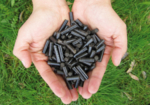
Microbial raw material recycling
While the use of biotechnological methods for the purification of water, soil and air has already been state of the art for quite a few years, the use of microorganisms for the recovery of metal and mineral raw materials from industrial and agricultural waste has also started to attract the interest of scientists. This dossier addresses this topic, explains what geobiotechnology and urban mining are all about.
https://www.biooekonomie-bw.de/en/articles/dossiers/microbial-raw-material-recycling -
Dossier - 09/12/2013 
Industrial biotechnology biological resources for industrial processes
Industrial or white biotechnology uses microorganisms and enzymes to produce goods for industry, including chemicals, plastics, food, agricultural and pharmaceutical products and energy carriers. Renewable raw materials and increasingly also waste from agriculture and forestry are used for the manufacture of industrial goods.
https://www.biooekonomie-bw.de/en/articles/dossiers/industrial-biotechnology-biological-resources-for-industrial-processes -
Dossier - 18/11/2013 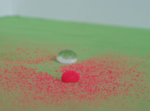
Innovative textiles made possible by biotechnology
Biotechnology plays a part in many high-tech fabrics that have become an integral part of our everyday life. Whether it is products for the treatment of wounds, fabrics for marquees or for clothing, many materials have been developed or are produced using biotechnological techniques and processes. Many products marketed as “micro” or “nano” are inspired by nature.
https://www.biooekonomie-bw.de/en/articles/dossiers/innovative-textiles-made-possible-by-biotechnology -
Dossier - 23/09/2013 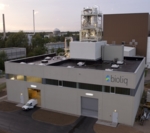
Bioeconomy a new model for industry and the economy
On the one hand, a bioeconomy relies on renewable resources to meet society’s need for food, energy and industrial products. On the other, it emphasises the role of biogenic material flows. The bioeconomy model is expected to reduce our dependency on fossil fuels in the long term. In order to implement the shift to a biobased economy on the regional level, the Baden-Württemberg government launched the Bioeconomy Research Strategy in summer 2013.
https://www.biooekonomie-bw.de/en/articles/dossiers/bioeconomy-a-new-model-for-industry-and-the-economy -
Dossier - 25/03/2013 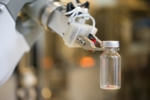
Biotechnology goes automated
Processes that previously required pipetting analysis and production to be carried out manually are increasingly now controlled by automated systems. However this has not necessarily involved a complete reinvention of the wheel instead automation systems used in the plant construction and mechanical engineering sectors are being adapted and optimised for application in the life sciences.
https://www.biooekonomie-bw.de/en/articles/dossiers/biotechnology-goes-automated -
Dossier - 22/10/2012 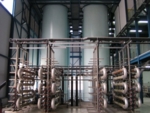
Environmental biotechnology
Biotechnologists are increasingly learning how to apply the knowledge about biological metabolic processes in the field of environmental protection including waste management and environmental rehabilitation. Environmental biotechnology is a field with great potential. In future bacteria and other microorganisms will most likely also contribute to sustainability and cost efficiency in other areas including the cosmetics and detergent industry as…
https://www.biooekonomie-bw.de/en/articles/dossiers/environmental-biotechnology -
Dossier - 08/10/2012 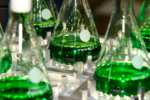
Marine biotechnology unknown sources of hope from the depths of the sea
Biotechnological methods are used to investigate marine life and the results obtained from these investigations advance research in the fields of medicine and energy and into substances used as food supplements and cosmetics. The area of marine biotechnology is fairly diverse. Although it is not on the coast even the southern German state of Baden-Württemberg is involved in marine biotechnology.
https://www.biooekonomie-bw.de/en/articles/dossiers/marine-biotechnology-unknown-sources-of-hope-from-the-depths-of-the-sea -
Dossier - 01/10/2012 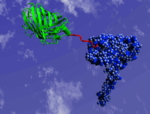
Systems biology understanding complex biological systems
Systems biology studies complex interactions within biological systems on the genome proteome and organelle level. Many techniques from the fields of systems theory and associated fields can be used to gain an understanding of the behaviour and biological mechanisms of cellular systems.
https://www.biooekonomie-bw.de/en/articles/dossiers/systems-biology-understanding-complex-biological-systems -
Dossier - 10/09/2012 
Horizon 2020 the EU framework programme for research and innovation a boost for top-level research in Europe
In the face of the ongoing financial crisis Europe is working on a new research strategy that is aimed at creating new economic growth and jobs. The new EU framework programme for research and innovation Horizon 2020 replaces the 7th Framework Programme FP7 and will run from 2014 with a budget of 80 billion. In July 2012 Brussels launched the final FP7 calls for proposals for 2013 that offer numerous market-based instruments designed to bridge…
https://www.biooekonomie-bw.de/en/articles/dossiers/horizon-2020-the-eu-framework-programme-for-research-and-innovation-a-boost-for-top-level-research-i -
Dossier - 23/07/2012 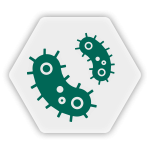
Extremophilic bacteria
Extremophilic bacteria love it hot, sour or salty, toxic substances like heavy metals also do them good and even give them energy. As molecular and systems biology techniques get better and better, industry is also becoming increasingly interested in these exotic organisms. What potential does knowing the biochemistry of extremophilic bacteria have for the pharmaceutical, cosmetics and sanitary articles industries?
https://www.biooekonomie-bw.de/en/articles/dossiers/extremophilic-bacteria -
Dossier - 14/05/2012 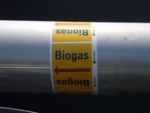
Biogas a promising source of renewable energy?
In addition to sunlight water and wind biogas is a regenerative source of energy that contributes to saving fossil resources. Germany is home to around 7100 biogas plants including 796 as of 2011 in Baden-Württemberg. In 2010 these facilities produced 11 per cent of the electricity generated from renewables in Germany. Energy-rich methane is the major constituent of biogas and is produced when organic compounds are broken down by bacteria in the…
https://www.biooekonomie-bw.de/en/articles/dossiers/biogas-a-promising-source-of-renewable-energy -
Dossier - 26/03/2012 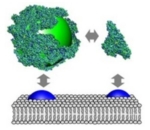
Nanobiotechnology
What is nanobiotechnology what is the difference between nanotechnology and nanobiotechnology and where and what nanobiotechnological research is being carried out in Germany and more particularly in Baden-Württemberg and which applications is it aimed at?
https://www.biooekonomie-bw.de/en/articles/dossiers/nanobiotechnology
